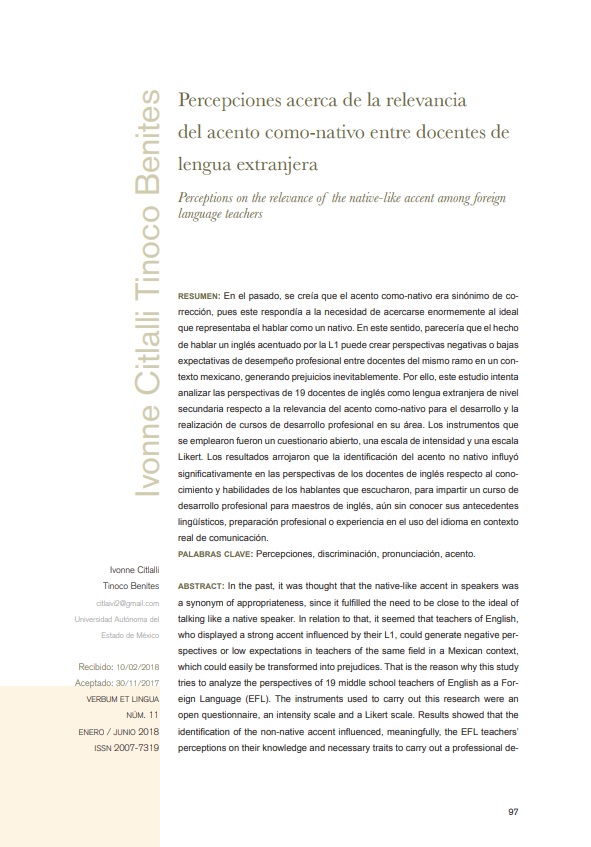Perceptions on the relevance of the native-like accent among foreign language teachers
DOI:
https://doi.org/10.32870/vel.vi11.105Keywords:
Perceptions, discrimination, pronunciation, accent.Abstract
In the past, it was thought that the native-like accent in speakers was a synonym of appropriateness, since it fulfilled the need to be close to the ideal of talking like a native speaker. In relation to that, it seemed that teachers of English, who displayed a strong accent influenced by their L1, could generate negative perspectives or low expectations in teachers of the same field in a Mexican context, which could easily be transformed into prejudices. That is the reason why this study tries to analyze the perspectives of 19 middle school teachers of English as a Foreign Language (EFL). The instruments used to carry out this research were an open questionnaire, an intensity scale and a Likert scale. Results showed that the identification of the non-native accent influenced, meaningfully, the EFL teachers’ perceptions on their knowledge and necessary traits to carry out a professional development (PD) course for teachers of English, even if they did not know anything
about the speakers’ linguistic background, professional preparation or experience using the English language in a real context of communication.
Downloads
References
Alcaraz, E. & Moody, B. (1993). Fonética inglesa para españoles. Alcoly: Marfil.
Kamisili, S. & Dugan, S. (1997). Nonnative speakers’ speech perception of native speakers. (ERIC Document Reproduction Service No. ED461266).
Arboleda, A. & Castro, A. (2012). The Accented EFL Teacher: Classroom Implications. Profile: Issues in Teachers’ Professional Development, 14(2), 45-62.
Ballard, L. (2013). Students Attitudes towards Accentedness of Native and 110 Ivonne Citlalli Tinoco Benites. Percepciones acerca de la relevancia del acento... Non/Native Speaking English Teachers. MSU Working Papers in SLS, 4, 47-73.
Bryla-Cruz, A. (2016). Foreign Accent Perception: Polish English in the British Ears. New Castle: Cambridge Scholar Publishing.
Gluszek, A. & Dovidio, J. (2010). Speaking with a Non-native Accent: Perceptions of Bias, Communication Difficulties, and Belonging in the United States. Journal of Language and Social Psychology, 29(2), 224–234.
Jaber, M. & Hussein, R. (2011). Native Speakers’ Perception of Non-Native English Speech. English Language Teaching, 4, 77-87
Leung, C. Harris, R. & Rampton, B. (1997). The idealized native speaker. Reified ethnicities, and classroom realities. TESOL Quarterly, 31(3), 543-560.
Murillo, F. (2006). Cuestionarios y escalas de actitudes. Madrid: Universidad Autónoma de Madrid.
Neisser, U. (1978). Perceiving, Anticipating, and Imagining. University of Minnesota Press, Perception and Cognition Issues in the Foundations of Psychology, 9, 89-105.
Osorio Rojas, R. A. (2009). El cuestionario. Universidad de Antioquia, Facultad De Ciencias Sociales y Humanas. Centro de Estudios de Opinión, 9, 1-15.
Santana-Williamson, E. (2002). ESL Students’ Attitudes toward Native and Non-Native Speaking Instructors’ Accents. The CATESOL Journal, 14(1), 57-72.
Schiffman, L. & Kanuk, E. (2007). Consumer Behavior. New Delhi: Prentice-Hall. Skutnabb-Kangas, T. (1988). Multilingualism and the education of minority children. En T. Skutnabb-Kangas & J. Cummins (Eds.), Minority Education: From Shame to Struggle. (9-44). Clevedon, Avon: Multilingual Matters.
Solís, M. (2002). The Matched Guise Technique: A Critical Approximation to a Classic Test for Formal Measurement of Language Attitudes. Noves SL. Revista de Sociolingüística, (s/d): 1-6.
Tajeddin, Z. & Adeh, A. (2016). Native and Non-Native English Teachers Perceptions of their Professional Identity: Convergent or Divergent? Iranian Journal of Language Teaching Research, 4(3), 37-54.
Yantis, S. (2002). Stevens’ Handbook of Experimental Psychology, Sensation and Perception. New York: John Wiley and Sons.













